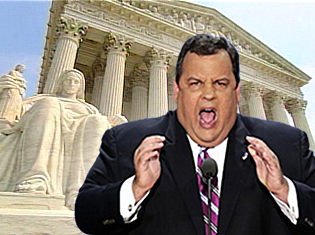 New Jersey Gov. Chris Christie has officially confirmed that he will take his state’s quest for legal sports betting all the way to the US Supreme Court. In September, a three-judge panel of the US Third Circuit Court of Appeals rejected New Jersey’s ongoing effort to overturn the federal PASPA sports betting prohibition and last Friday the same court rejected the state’s request for a rehearing of its case by a full complement of judges. The denial leaves the Supreme Court as the last card New Jersey has yet to play. The state has until Feb. 15 to file its application (although it can apply for a 60-day extension).
New Jersey Gov. Chris Christie has officially confirmed that he will take his state’s quest for legal sports betting all the way to the US Supreme Court. In September, a three-judge panel of the US Third Circuit Court of Appeals rejected New Jersey’s ongoing effort to overturn the federal PASPA sports betting prohibition and last Friday the same court rejected the state’s request for a rehearing of its case by a full complement of judges. The denial leaves the Supreme Court as the last card New Jersey has yet to play. The state has until Feb. 15 to file its application (although it can apply for a 60-day extension).
Christie spokesman Colin Reed issued a statement saying the governor “has said all along this issue should be decided by the US Supreme Court and that’s what he hopes will happen next … The people of New Jersey voted overwhelmingly to bring sports betting to New Jersey and the Governor agrees with his constituents and will not give up this fight.” Christie has instructed Theodore Olson and the other high-wattage attorneys representing the state to file the necessary applications to convince the Supremes to hear the case.
The question now becomes: will the Supremes take the bait? The odds (no pun intended) are against it. Becker & Poliakoff attorney Daniel Wallach has written a lengthy analysis of New Jersey’s chances of winning a date with Roberts, Scalia et al, and his reading of history says less than 2% of all Supreme Court petitions are granted. Worse, that number has trended sharply downward in recent years, with the Court agreeing to hear only 77 of the roughly 8k petitions it received last year – a success rate of just 0.0375%. Wallach is therefore pessimistic that the Court will grant New Jersey’s bid a hearing, but acknowledges that the suit’s federalism questions might pique the Court’s interest. Either way, we likely won’t learn the answer until sometime between May 1 and the end of the Court’s current term in late June.






